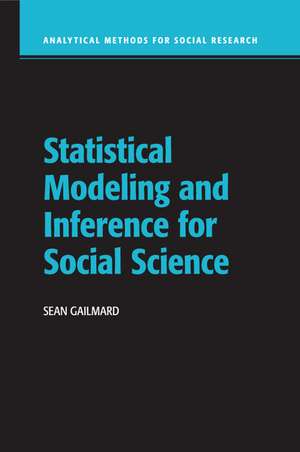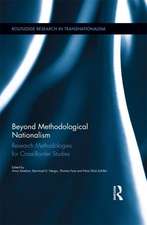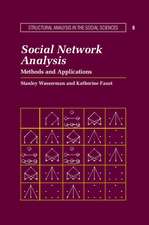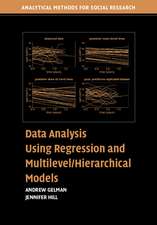Statistical Modeling and Inference for Social Science: Analytical Methods for Social Research
Autor Sean Gailmarden Limba Engleză Paperback – 5 apr 2017
| Toate formatele și edițiile | Preț | Express |
|---|---|---|
| Paperback (1) | 275.08 lei 43-57 zile | |
| Cambridge University Press – 5 apr 2017 | 275.08 lei 43-57 zile | |
| Hardback (1) | 531.85 lei 43-57 zile | |
| Cambridge University Press – 8 iun 2014 | 531.85 lei 43-57 zile |
Preț: 275.08 lei
Nou
Puncte Express: 413
Preț estimativ în valută:
52.65€ • 57.21$ • 44.26£
52.65€ • 57.21$ • 44.26£
Carte tipărită la comandă
Livrare economică 21 aprilie-05 mai
Preluare comenzi: 021 569.72.76
Specificații
ISBN-13: 9781316622223
ISBN-10: 1316622223
Pagini: 391
Ilustrații: 18 b/w illus. 18 tables
Dimensiuni: 150 x 230 x 24 mm
Greutate: 0.57 kg
Editura: Cambridge University Press
Colecția Cambridge University Press
Seria Analytical Methods for Social Research
Locul publicării:New York, United States
ISBN-10: 1316622223
Pagini: 391
Ilustrații: 18 b/w illus. 18 tables
Dimensiuni: 150 x 230 x 24 mm
Greutate: 0.57 kg
Editura: Cambridge University Press
Colecția Cambridge University Press
Seria Analytical Methods for Social Research
Locul publicării:New York, United States
Cuprins
1. Introduction; 2. Descriptive statistics: data and information; 3. Observable data and data-generating processes; 4. Probability theory: basic properties of data-generating processes; 5. Expectation and moments: summaries of data-generating processes; 6. Probability and models: linking positive theories and data-generating processes; 7. Sampling distributions: linking data-generating processes and observable data; 8. Hypothesis testing: assessing claims about the data-generating process; 9. Estimation: recovering properties of the data-generating process; 10. Causal inference: inferring causation from correlation; Afterword: statistical methods and empirical research.
Recenzii
'With careful consideration for both rigor and intuition, Gailmard fills a large void in the social science literature. Those seeking clear mathematical exposition will not be disappointed. Those hoping for substantive applications to illuminate the data analysis will also be pleased. This book strikes a nearly perfect balance.' Wendy K. Tam Cho, National Center for Supercomputing Applications and University of Illinois, Urbana-Champaign
'This is the single best book on modeling in social science - it goes beyond any extant book and will without a doubt become the standard text in methods courses throughout the social sciences.' James N. Druckman, Payson S. Wild Professor of Political Science, Northwestern University, Illinois
'In Statistical Modeling and Inference for Social Science, Gailmard provides a complete and well-written review of statistical modeling from the modern perspective of causal inference. It provides all the material necessary for an introduction to quantitative methods for social science students.' Jonathan N. Katz, Kay Sugahara Professor of Social Sciences and Statistics, and Chair, Division of the Humanities and Social Sciences, California Institute of Technology
'This is the single best book on modeling in social science - it goes beyond any extant book and will without a doubt become the standard text in methods courses throughout the social sciences.' James N. Druckman, Payson S. Wild Professor of Political Science, Northwestern University, Illinois
'In Statistical Modeling and Inference for Social Science, Gailmard provides a complete and well-written review of statistical modeling from the modern perspective of causal inference. It provides all the material necessary for an introduction to quantitative methods for social science students.' Jonathan N. Katz, Kay Sugahara Professor of Social Sciences and Statistics, and Chair, Division of the Humanities and Social Sciences, California Institute of Technology
Notă biografică
Descriere
This textbook is an introduction to probability theory, statistical inference and statistical modeling for graduate students and practitioners beginning social science research.





























